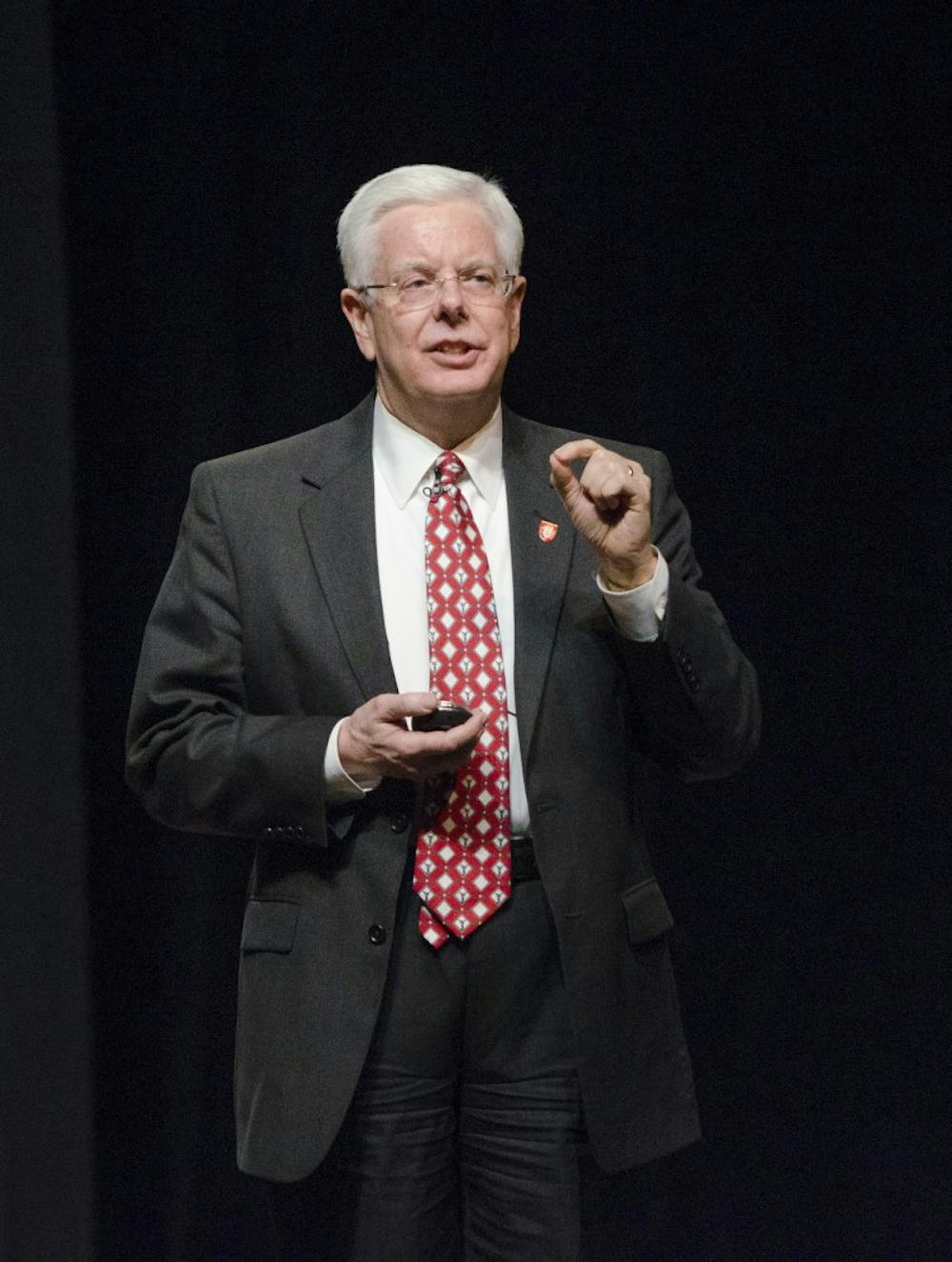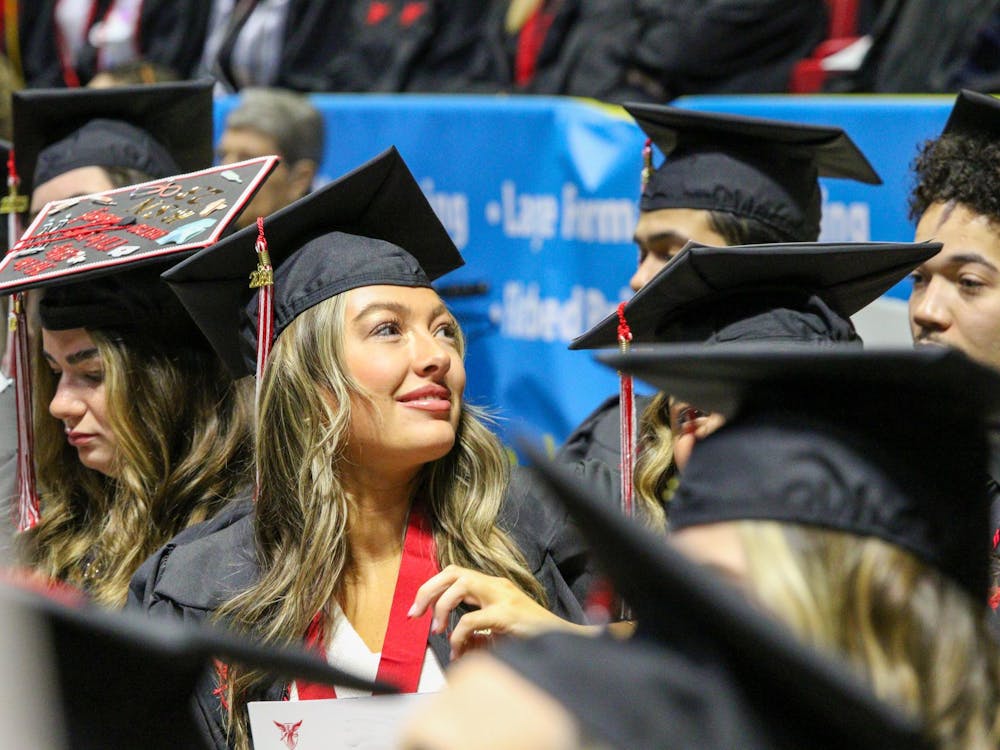The Grant Process
The notion of a grant application may seem like something that happens with funds from an outside group, but Ball State offers many in-house grants for things ranging from creative teaching grants to conference attendance support.
Robert Morris with the Sponsored Projects Office administration said Ball State chose a grant system to give this money out because it puts all the ideas on an equal playing field.
He said while there are many great projects happening on campus, they may not know about all of the projects that have the potential to address the President’s goals—student-centered, community-engaged and those driven toward a 21st century research institution.
“When you have a limited pool of money, to meet a specific purpose, [with] a large number of interesting projects and can’t fund them all, you want to see which ideas rise to the top,” Morris said. [The grant method] presents an equal playing field to meet those goals.”
Grants typically come with specific objectives, just like Ferguson’s three goals. Morris also said grant applications require specific budget requests and are reviewed by peers. If a grant is awarded, the funds go into an account specifically for that project.
The Sponsored Programs Office helps faculty with the entire grant application process, and if they are awarded the grant, during the grant award period as well.
He said they help faculty to budget appropriately for their goals in fund requests.
Departments and colleges on campus are in competition for a share of $3 million—funds available to start new entrepreneurial initiatives.
During his State of the University address, Ball State President Paul W. Ferguson announced the Academic Excellence Grants, which give departments the chance to be awarded funds up to $100,000 for three years.
“We will not only support a culture of positive change and opportunity and interdisciplinary project development, but we will focus on tangible strategies to enhance our academic environment,” Ferguson said in an email from spokeswoman Joan Todd.
The funds for the program will come from the Ball State Foundation from past private donations.
Honors College professor Timothy Berg is working on the application for the Honors College. He sees grant competition as Ferguson backing up the idea of entrepreneurial learning.
“It’s easy to say things and not follow up with actual incentives to make us do it,” Berg said. “We’re not getting paid extra but we’re able to do and realize interesting things. The best ideas will win these grants and I like that.”
Berg said because the grants aren’t for things like a new copier, they have energized him to think of ideas that may be seen as a risk.
“We can take risks knowing we can go out on a limb and try something new,” he said. “If we fail, we’re right back where we are. We know we are already sitting on good solid ground with what we are doing.”
Ferguson said the Strategic Planning Leadership Team, which will award the grants, will balance the risk versus return when deciding grants. This will be based on the possible outcomes and growth potential versus the capabilities of the project team.
Proposals are due by Aug. 1 and grants will be announced by Aug. 8. The three-year funding period will continue through 2018. With the grants being awarded at the beginning of the upcoming Fall Semester, Ferguson said no grants are expected to show results by the end of Fall 2015.
Departmental Perspectives:
School of Music
When Ryan Hourigan, interim director of the School of Music, found out about the grant program, he called a faculty meeting to brainstorm ideas.
The school is now in later rounds of idea generation and wants to pursue two ideas with the grant money—supporting entrepreneurship in music and a community School of Music.
Hourigan said entrepreneurship fits well with music because orchestra jobs or other traditional music jobs are in short supply—students need to learn how to market themselves, their skills and start new opportunities.
To help students do that, he wants to start a residency program that will feature entrepreneurial artists. He also wants to help students getting a Certificate in Entrepreneurship with their capstone projects.
“They’re not connected to anything else but themselves,” he said of entrepreneurial artists. “They make their living by marketing their thing and we [would] bring them in for a week to teach and demonstrate. If we have money behind it, we are going to be able to get the people you would want to have in here—the 'Steve Jobs' of entrepreneurial music.”
He said the grant program could be just in time.
“It could be right when we are refocusing some of our efforts,” he said. “It’s going to be competitive. If we don’t win the grant, we’re still going to go down that track but it will take a while to generate [monetary] support.”
Marketing Department
This year, the marketing department recognized the shift in real-world marketing toward social media with a shift in their curriculum.
The department added a social media analytics and strategy class in the fall.
If they win the grant money, the department wants to create a digital marketing lab with a new student agency that would provide social media analytics along with marketing strategy to businesses.
Department chair Susan Mantel said the idea came out of conversations with their business advisory board. It would cater to small- or medium-sized businesses, sales forces looking to run a social media campaign or a sales force looking to integrate social media into their sales strategy.
"One thing we have is business buy-in and I think that’s really important,” she said. [It is a] three-prong approach. We’ve got the businesses, we’ve got the students—we just need the money.”
Mantel said the grants will be very competitive and there will be opportunity for cross-departmental collaboration.
“They’re not going to be able to fund all of them, but everybody is coming up with these ideas,” Mantel said. "I think there is some integration that can happen. Even the ones that don’t get funded, the idea will be there and they will figure out a way to make it happen, [but] it will take a lot longer.”
|
The Grant Process The notion of a grant application may seem like something that happens with funds from an outside group, but Ball State offers many in-house grants for things ranging from creative teaching grants to conference attendance support. Robert Morris with the Sponsored Projects Office administration said Ball State chose a grant system to give this money out because it puts all the ideas on an equal playing field. He said while there are many great projects happening on campus, they may not know about all of the projects that have the potential to address the President’s goals—student-centered, community-engaged and those driven toward a 21st century research institution. “When you have a limited pool of money, to meet a specific purpose, [with] a large number of interesting projects and can’t fund them all, you want to see which ideas rise to the top,” Morris said. [The grant method] presents an equal playing field to meet those goals.” Grants typically come with specific objectives, just like Ferguson’s three goals. Morris also said grant applications require specific budget requests and are reviewed by peers. If a grant is awarded, the funds go into an account specifically for that project. The Sponsored Programs Office helps faculty with the entire grant application process, and if they are awarded the grant, during the grant award period as well. He said they help faculty to budget appropriately for their goals in fund requests. |





